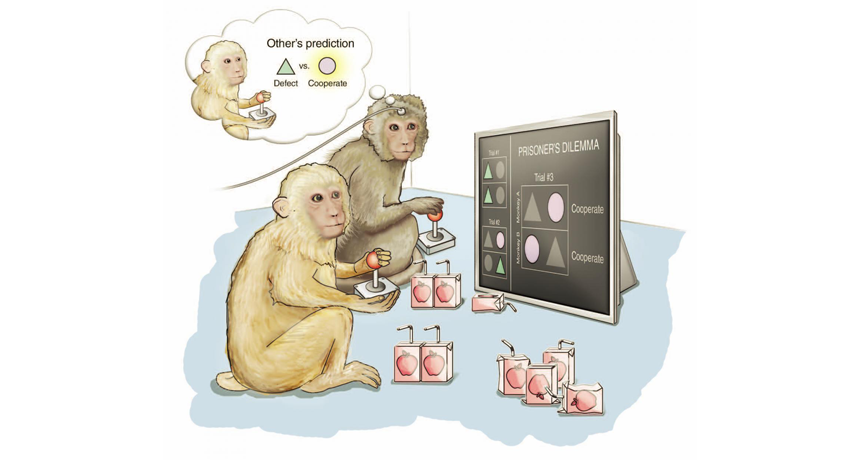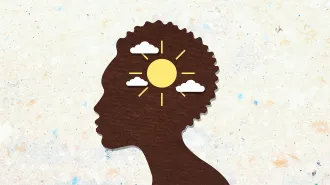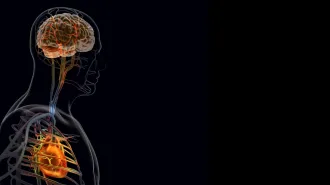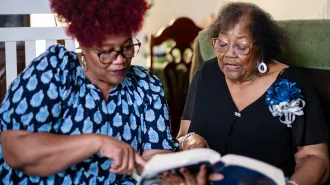Brain cells predict opponent’s move in game-playing monkeys
Neurons sensitive to others’ intentions could offer clues to disorders that impair social judgments

GAME ON Researchers have discovered brain cells in video game-playing macaques that predict another monkey’s next move. Such brain cells may be important in social interactions that require anticipating what others are thinking.
Katie Ris-Vicari/Cell 2015
Newly discovered brain cells in monkeys can predict another monkey’s actions in a cooperation game. If such brain cells also exist in humans, they may be important in social interactions that require calculating another person’s intentions.
The brain cells were found in rhesus macaques playing a video game called the prisoner’s dilemma. The cells keep track of how other monkeys behaved in previous rounds of the game and predict the other monkeys’ next move, researchers report online February 26 in Cell.
Neuroscientists Keren Haroush and Ziv Williams, both of Harvard Medical School, made the discovery while recording electrical activity of brain nerve cells, or neurons, in a part of the brain known to be involved in social interactions. That part of the brain, the anterior cingulate cortex, is believed to be involved in autism spectrum disorders, schizophrenia and other maladies that impair people’s ability to judge what others are thinking. Learning how these cells work may help researchers understand the disorders and improve treatments, the scientists say.
Haroush and Williams found the cells by implanting electrodes into the back part of the anterior cingulate in four male macaques and then teaching them to play the game.
Two monkeys played the game sitting side by side. Using a joystick, the monkeys selected a symbol on a screen that indicated whether or not they were willing to cooperate with their opponent to win a juice reward. If both monkeys cooperated, they would each win four drops of juice. If one chose to cooperate, but the other opted out, the uncooperative monkey would get six drops of juice while the obliging monkey got only a single drop of juice. If both got greedy and chose not to cooperate, they both got less reward than if they collaborated.
Some neurons in the anterior cingulate cortex became more active just before the monkeys made their choices. Haroush and Williams compared the activity patterns of the neurons with the outcome of the game. One set of neurons fired off electrical signals more rapidly if the other monkey ended up cooperating. Another group of neurons got fired up if the other monkey ended up defecting. Together, the cells’ activity correctly predicted the other monkey’s choices 79.4 percent of the time, the researchers found. Neuron activity also matched the other monkey’s choice in the previous round of the game, indicating that the cells were keeping track of the other guy’s actions, Williams says.
Activity of a different set of neurons in the same part of the brain foreshadowed the monkey’s own future choices, but with less accuracy. The neurons correctly picked the monkey’s own choice 54.7 percent of the time. Other parts of the brain also weigh in on the monkey’s own decisions, Haroush says.
Pulses of electricity that disrupt the anterior cingulate cortex’s function impaired the monkeys’ ability to cooperate. That finding indicates that performance in the game depends on neurons in that brain region.
The neurons became active when the monkeys were hanging out together playing video games, but fewer fired when the animals played in separate rooms or against a computer. The result indicates that the neurons are sensitive to social situations, Haroush says.
Other researchers aren’t completely sold that the neurons really forecast the next move by keeping track of previous plays, says Marco Iacoboni, a neuroscientist at UCLA. Other social cues, such as body language, may be tipping the monkeys off to their opponents’ moves, he says. How well the monkeys know each other and their position in the social group may also affect their game play, he suggests.
Playing a prisoner’s dilemma game is a strange social interaction, Iacoboni adds. Cooperation in the game is different from empathy that, for instance, leads people to steady a falling stranger. The monkeys’ sort of cooperation is akin to two businessmen striking a deal. “I would call these neurons the deal-making neurons,” he says. “There’s an embedded selfishness in these interactions. It’s very Machiavellian.”
Editor’s note: This story was updated on March 12, 2015, to note that in one of the experiments an uncooperative monkey received six, not eight, drops of juice, and to clarify that fewer, not none, of the neurons fired when the animals played in separate rooms or against a computer.







